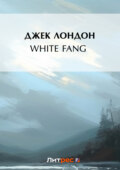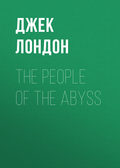
Джек Лондон
Мартин Иден / Martin Eden
Chapter XXXIII
Martin was steadily losing his battle. Economize as he would, the earnings from hack-work did not balance expenses. Thanksgiving found him with his black suit in pawn and unable to accept the Morses’ invitation to dinner. Ruth was not made happy by his reason for not coming, and the corresponding effect on him was one of desperation. He told her that he would come, after all; that he would go over to San Francisco, to the Transcontinental office, collect the five dollars due him, and with it redeem his suit of clothes.
In the morning he borrowed ten cents from Maria. He would have borrowed it, by preference, from Brissenden, but that erratic individual had disappeared. Two weeks had passed since Martin had seen him, and he vainly cudgelled his brains for some cause of offence. The ten cents carried Martin across the ferry to San Francisco, and as he walked up Market Street he speculated upon his predicament in case he failed to collect the money. There would then be no way for him to return to Oakland, and he knew no one in San Francisco from whom to borrow another ten cents.
The door to the Transcontinental office was ajar, and Martin, in the act of opening it, was brought to a sudden pause by a loud voice from within, which exclaimed:– «But that is not the question, Mr. Ford.» (Ford, Martin knew, from his correspondence, to be the editor’s name.) «The question is, are you prepared to pay?-cash, and cash down, I mean? I am not interested in the prospects of the Transcontinental and what you expect to make it next year. What I want is to be paid for what I do. And I tell you, right now, the Christmas Transcontinental don’t go to press till I have the money in my hand. Good day. When you get the money, come and see me.»
The door jerked open, and the man flung past Martin, with an angry countenance and went down the corridor, muttering curses and clenching his fists. Martin decided not to enter immediately, and lingered in the hallways for a quarter of an hour. Then he shoved the door open and walked in. It was a new experience, the first time he had been inside an editorial office. Cards evidently were not necessary in that office, for the boy carried word to an inner room that there was a man who wanted to see Mr. Ford. Returning, the boy beckoned him from halfway across the room and led him to the private office, the editorial sanctum. Martin’s first impression was of the disorder and cluttered confusion of the room. Next he noticed a bewhiskered, youthful-looking man, sitting at a roll-top desk, who regarded him curiously. Martin marvelled at the calm repose of his face. It was evident that the squabble with the printer had not affected his equanimity.
«I– I am Martin Eden,» Martin began the conversation. («And I want my five dollars,» was what he would have liked to say.)
But this was his first editor, and under the circumstances he did not desire to scare him too abruptly. To his surprise, Mr. Ford leaped into the air with a «You don’t say so!» and the next moment, with both hands, was shaking Martin’s hand effusively.
«Can’t say how glad I am to see you, Mr. Eden. Often wondered what you were like.»
Here he held Martin off at arm’s length and ran his beaming eyes over Martin’s second-best suit, which was also his worst suit, and which was ragged and past repair, though the trousers showed the careful crease he had put in with Maria’s flat-irons.
«I confess, though, I conceived you to be a much older man than you are. Your story, you know, showed such breadth, and vigor, such maturity and depth of thought. A masterpiece, that story-I knew it when I had read the first half-dozen lines. Let me tell you how I first read it. But no; first let me introduce you to the staff.»
Still talking, Mr. Ford led him into the general office, where he introduced him to the associate editor, Mr. White, a slender, frail little man whose hand seemed strangely cold, as if he were suffering from a chill, and whose whiskers were sparse and silky.
«And Mr. Ends, Mr. Eden. Mr. Ends is our business manager, you know.»
Martin found himself shaking hands with a cranky-eyed, bald-headed man, whose face looked youthful enough from what little could be seen of it, for most of it was covered by a snow-white beard, carefully trimmed-by his wife, who did it on Sundays, at which times she also shaved the back of his neck.
The three men surrounded Martin, all talking admiringly and at once, until it seemed to him that they were talking against time for a wager.
«We often wondered why you didn’t call,» Mr. White was saying.
«I didn’t have the carfare, and I live across the Bay,» Martin answered bluntly, with the idea of showing them his imperative need for the money.
Surely, he thought to himself, my glad rags in themselves are eloquent advertisement of my need. Time and again, whenever opportunity offered, he hinted about the purpose of his business. But his admirers’ ears were deaf. They sang his praises, told him what they had thought of his story at first sight, what they subsequently thought, what their wives and families thought; but not one hint did they breathe of intention to pay him for it.
«Did I tell you how I first read your story?» Mr. Ford said. «Of course I didn’t. I was coming west from New York, and when the train stopped at Ogden, the train-boy on the new run brought aboard the current number of the Transcontinental.»
My God! Martin thought; you can travel in a Pullman while I starve for the paltry five dollars you owe me. A wave of anger rushed over him. The wrong done him by the Transcontinental loomed colossal, for strong upon him were all the dreary months of vain yearning, of hunger and privation, and his present hunger awoke and gnawed at him, reminding him that he had eaten nothing since the day before, and little enough then. For the moment he saw red. These creatures were not even robbers. They were sneak-thieves. By lies and broken promises they had tricked him out of his story. Well, he would show them. And a great resolve surged into his will to the effect that he would not leave the office until he got his money. He remembered, if he did not get it, that there was no way for him to go back to Oakland. He controlled himself with an effort, but not before the wolfish expression of his face had awed and perturbed them.
They became more voluble than ever. Mr. Ford started anew to tell how he had first read «The Ring of Bells,» and Mr. Ends at the same time was striving to repeat his niece’s appreciation of «The Ring of Bells,» said niece being a school-teacher in Alameda.
«I’ll tell you what I came for,» Martin said finally. «To be paid for that story all of you like so well. Five dollars, I believe, is what you promised me would be paid on publication.»
Mr. Ford, with an expression on his mobile features of mediate and happy acquiescence, started to reach for his pocket, then turned suddenly to Mr. Ends, and said that he had left his money home. That Mr. Ends resented this, was patent; and Martin saw the twitch of his arm as if to protect his trousers pocket. Martin knew that the money was there.
«I am sorry,» said Mr. Ends, «but I paid the printer not an hour ago, and he took my ready change. It was careless of me to be so short; but the bill was not yet due, and the printer’s request, as a favor, to make an immediate advance, was quite unexpected.»
Both men looked expectantly at Mr. White, but that gentleman laughed and shrugged his shoulders. His conscience was clean at any rate. He had come into the Transcontinental to learn magazine-literature, instead of which he had principally learned finance. The Transcontinental owed him four months’ salary, and he knew that the printer must be appeased before the associate editor.
«It’s rather absurd, Mr. Eden, to have caught us in this shape,» Mr. Ford preambled airily. «All carelessness, I assure you. But I’ll tell you what we’ll do. We’ll mail you a check the first thing in the morning. You have Mr. Eden’s address, haven’t you, Mr. Ends?»
Yes, Mr. Ends had the address, and the check would be mailed the first thing in the morning. Martin’s knowledge of banks and checks was hazy, but he could see no reason why they should not give him the check on this day just as well as on the next.
«Then it is understood, Mr. Eden, that we’ll mail you the check to-morrow?» Mr. Ford said.
«I need the money to-day,» Martin answered stolidly.
«The unfortunate circumstances-if you had chanced here any other day,» Mr. Ford began suavely, only to be interrupted by Mr. Ends, whose cranky eyes justified themselves in his shortness of temper.
«Mr. Ford has already explained the situation,» he said with asperity. «And so have I. The check will be mailed-»
«I also have explained,» Martin broke in, «and I have explained that I want the money to-day.»
He had felt his pulse quicken a trifle at the business manager’s brusqueness, and upon him he kept an alert eye, for it was in that gentleman’s trousers pocket that he divined the Transcontinental’s ready cash was reposing.
«It is too bad-» Mr. Ford began.
But at that moment, with an impatient movement, Mr. Ends turned as if about to leave the room. At the same instant Martin sprang for him, clutching him by the throat with one hand in such fashion that Mr. Ends’ snow-white beard, still maintaining its immaculate trimness, pointed ceilingward at an angle of forty-five degrees. To the horror of Mr. White and Mr. Ford, they saw their business manager shaken like an Astrakhan rug.
«Dig up, you venerable discourager of rising young talent!» Martin exhorted. «Dig up, or I’ll shake it out of you, even if it’s all in nickels.» Then, to the two affrighted onlookers: «Keep away! If you interfere, somebody’s liable to get hurt.»
Mr. Ends was choking, and it was not until the grip on his throat was eased that he was able to signify his acquiescence in the digging-up programme. All together, after repeated digs, its trousers pocket yielded four dollars and fifteen cents.
«Inside out with it,» Martin commanded.
An additional ten cents fell out. Martin counted the result of his raid a second time to make sure.
«You next!» he shouted at Mr. Ford. «I want seventy-five cents more.»
Mr. Ford did not wait, but ransacked his pockets, with the result of sixty cents.
«Sure that is all?» Martin demanded menacingly, possessing himself of it. «What have you got in your vest pockets?»
In token of his good faith, Mr. Ford turned two of his pockets inside out. A strip of cardboard fell to the floor from one of them. He recovered it and was in the act of returning it, when Martin cried:
«What’s that?-A ferry ticket? Here, give it to me. It’s worth ten cents. I’ll credit you with it. I’ve now got four dollars and ninety-five cents, including the ticket. Five cents is still due me.»
He looked fiercely at Mr. White, and found that fragile creature in the act of handing him a nickel.
«Thank you,» Martin said, addressing them collectively. «I wish you a good day.»
«Robber!» Mr. Ends snarled after him.
«Sneak– thief!» Martin retorted, slamming the door as he passed out.
Martin was elated-so elated that when he recollected that The Hornet owed him fifteen dollars for «The Peri and the Pearl,» he decided forthwith to go and collect it. But The Hornet was run by a set of clean-shaven, strapping young men, frank buccaneers who robbed everything and everybody, not excepting one another. After some breakage of the office furniture, the editor (an ex-college athlete), ably assisted by the business manager, an advertising agent, and the porter, succeeded in removing Martin from the office and in accelerating, by initial impulse, his descent of the first flight of stairs.
«Come again, Mr. Eden; glad to see you any time,» they laughed down at him from the landing above.
Martin grinned as he picked himself up.
«Phew!» he murmured back. «The Transcontinental crowd were nanny-goats, but you fellows are a lot of prize-fighters.»
More laughter greeted this.
«I must say, Mr. Eden,» the editor of The Hornet called down, «that for a poet you can go some yourself. Where did you learn that right cross-if I may ask?»
«Where you learned that half-Nelson,» Martin answered. «Anyway, you’re going to have a black eye.»
«I hope your neck doesn’t stiffen up,» the editor wished solicitously: «What do you say we all go out and have a drink on it-not the neck, of course, but the little rough-house?»
«I’ll go you if I lose,» Martin accepted.
And robbers and robbed drank together, amicably agreeing that the battle was to the strong, and that the fifteen dollars for «The Peri and the Pearl» belonged by right to The Hornet’s editorial staff.
Chapter XXXIV
Arthur remained at the gate while Ruth climbed Maria’s front steps. She heard the rapid click of the type-writer, and when Martin let her in, found him on the last page of a manuscript. She had come to make certain whether or not he would be at their table for Thanksgiving dinner; but before she could broach the subject Martin plunged into the one with which he was full.
«Here, let me read you this,» he cried, separating the carbon copies and running the pages of manuscript into shape. «It’s my latest, and different from anything I’ve done. It is so altogether different that I am almost afraid of it, and yet I’ve a sneaking idea it is good. You be judge. It’s an Hawaiian story. I’ve called it ‘Wiki-wiki.’»
His face was bright with the creative glow, though she shivered in the cold room and had been struck by the coldness of his hands at greeting. She listened closely while he read, and though he from time to time had seen only disapprobation in her face, at the close he asked:
«Frankly, what do you think of it?»
«I– I don’t know,» she, answered. «Will it-do you think it will sell?»
«I’m afraid not,» was the confession. «It’s too strong for the magazines. But it’s true, on my word it’s true.»
«But why do you persist in writing such things when you know they won’t sell?» she went on inexorably. «The reason for your writing is to make a living, isn’t it?»
«Yes, that’s right; but the miserable story got away with me. I couldn’t help writing it. It demanded to be written.»
«But that character, that Wiki-Wiki, why do you make him talk so roughly? Surely it will offend your readers, and surely that is why the editors are justified in refusing your work.»
«Because the real Wiki-Wiki would have talked that way.»
«But it is not good taste.»
«It is life,» he replied bluntly. «It is real. It is true. And I must write life as I see it.»
She made no answer, and for an awkward moment they sat silent. It was because he loved her that he did not quite understand her, and she could not understand him because he was so large that he bulked beyond her horizon.
«Well, I’ve collected from the Transcontinental,» he said in an effort to shift the conversation to a more comfortable subject. The picture of the bewhiskered trio, as he had last seen them, mulcted of four dollars and ninety cents and a ferry ticket, made him chuckle.
«Then you’ll come!» she cried joyously. «That was what I came to find out.»
«Come?» he muttered absently. «Where?»
«Why, to dinner to-morrow. You know you said you’d recover your suit if you got that money.»
«I forgot all about it,» he said humbly. «You see, this morning the poundman got Maria’s two cows and the baby calf, and-well, it happened that Maria didn’t have any money, and so I had to recover her cows for her. That’s where the Transcontinental fiver went-‘The Ring of Bells’ went into the poundman’s pocket.»
«Then you won’t come?»
He looked down at his clothing.
«I can’t.»
Tears of disappointment and reproach glistened in her blue eyes, but she said nothing.
«Next Thanksgiving you’ll have dinner with me in Delmonico’s,» he said cheerily; «or in London, or Paris, or anywhere you wish. I know it.»
«I saw in the paper a few days ago,» she announced abruptly, «that there had been several local appointments to the Railway Mail. You passed first, didn’t you?»
He was compelled to admit that the call had come for him, but that he had declined it. «I was so sure-I am so sure-of myself,» he concluded. «A year from now I’ll be earning more than a dozen men in the Railway Mail. You wait and see.»
«Oh,» was all she said, when he finished. She stood up, pulling at her gloves. «I must go, Martin. Arthur is waiting for me.»
He took her in his arms and kissed her, but she proved a passive sweetheart. There was no tenseness in her body, her arms did not go around him, and her lips met his without their wonted pressure.
She was angry with him, he concluded, as he returned from the gate. But why? It was unfortunate that the poundman had gobbled Maria’s cows. But it was only a stroke of fate. Nobody could be blamed for it. Nor did it enter his head that he could have done aught otherwise than what he had done. Well, yes, he was to blame a little, was his next thought, for having refused the call to the Railway Mail. And she had not liked «Wiki-Wiki.»
He turned at the head of the steps to meet the letter-carrier on his afternoon round. The ever recurrent fever of expectancy assailed Martin as he took the bundle of long envelopes. One was not long. It was short and thin, and outside was printed the address of The New York Outview. He paused in the act of tearing the envelope open. It could not be an acceptance. He had no manuscripts with that publication. Perhaps-his heart almost stood still at the-wild thought-perhaps they were ordering an article from him; but the next instant he dismissed the surmise as hopelessly impossible.
It was a short, formal letter, signed by the office editor, merely informing him that an anonymous letter which they had received was enclosed, and that he could rest assured the Outview’s staff never under any circumstances gave consideration to anonymous correspondence.
The enclosed letter Martin found to be crudely printed by hand. It was a hotchpotch of illiterate abuse of Martin, and of assertion that the «so-called Martin Eden» who was selling stories to magazines was no writer at all, and that in reality he was stealing stories from old magazines, typing them, and sending them out as his own. The envelope was postmarked «San Leandro.» Martin did not require a second thought to discover the author. Higginbotham’s grammar, Higginbotham’s colloquialisms, Higginbotham’s mental quirks and processes, were apparent throughout. Martin saw in every line, not the fine Italian hand, but the coarse grocer’s fist, of his brother-in-law.
But why? he vainly questioned. What injury had he done Bernard Higginbotham? The thing was so unreasonable, so wanton. There was no explaining it. In the course of the week a dozen similar letters were forwarded to Martin by the editors of various Eastern magazines. The editors were behaving handsomely, Martin concluded. He was wholly unknown to them, yet some of them had even been sympathetic. It was evident that they detested anonymity. He saw that the malicious attempt to hurt him had failed. In fact, if anything came of it, it was bound to be good, for at least his name had been called to the attention of a number of editors. Sometime, perhaps, reading a submitted manuscript of his, they might remember him as the fellow about whom they had received an anonymous letter. And who was to say that such a remembrance might not sway the balance of their judgment just a trifle in his favor?
It was about this time that Martin took a great slump in Maria’s estimation. He found her in the kitchen one morning groaning with pain, tears of weakness running down her cheeks, vainly endeavoring to put through a large ironing. He promptly diagnosed her affliction as La Grippe, dosed her with hot whiskey (the remnants in the bottles for which Brissenden was responsible), and ordered her to bed. But Maria was refractory. The ironing had to be done, she protested, and delivered that night, or else there would be no food on the morrow for the seven small and hungry Silvas.
To her astonishment (and it was something that she never ceased from relating to her dying day), she saw Martin Eden seize an iron from the stove and throw a fancy shirt-waist on the ironing-board. It was Kate Flanagan’s best Sunday waist, than whom there was no more exacting and fastidiously dressed woman in Maria’s world. Also, Miss Flanagan had sent special instruction that said waist must be delivered by that night. As every one knew, she was keeping company with John Collins, the blacksmith, and, as Maria knew privily, Miss Flanagan and Mr. Collins were going next day to Golden Gate Park. Vain was Maria’s attempt to rescue the garment. Martin guided her tottering footsteps to a chair, from where she watched him with bulging eyes. In a quarter of the time it would have taken her she saw the shirt-waist safely ironed, and ironed as well as she could have done it, as Martin made her grant.
«I could work faster,» he explained, «if your irons were only hotter.»
To her, the irons he swung were much hotter than she ever dared to use.
«Your sprinkling is all wrong,» he complained next. «Here, let me teach you how to sprinkle. Pressure is what’s wanted. Sprinkle under pressure if you want to iron fast.»
He procured a packing-case from the woodpile in the cellar, fitted a cover to it, and raided the scrap-iron the Silva tribe was collecting for the junkman. With fresh-sprinkled garments in the box, covered with the board and pressed by the iron, the device was complete and in operation.
«Now you watch me, Maria,» he said, stripping off to his undershirt and gripping an iron that was what he called «really hot.»
«An’ when he feenish da iron’ he washa da wools,» as she described it afterward. «He say, ‘Maria, you are da greata fool. I showa you how to washa da wools,’ an’ he shows me, too. Ten minutes he maka da machine-one barrel, one wheel-hub, two poles, justa like dat.»
Martin had learned the contrivance from Joe at the Shelly Hot Springs. The old wheel-hub, fixed on the end of the upright pole, constituted the plunger. Making this, in turn, fast to the spring-pole attached to the kitchen rafters, so that the hub played upon the woollens in the barrel, he was able, with one hand, thoroughly to pound them.
«No more Maria washa da wools,» her story always ended. «I maka da kids worka da pole an’ da hub an’ da barrel. Him da smarta man, Mister Eden.»
Nevertheless, by his masterly operation and improvement of her kitchen-laundry he fell an immense distance in her regard. The glamour of romance with which her imagination had invested him faded away in the cold light of fact that he was an ex-laundryman. All his books, and his grand friends who visited him in carriages or with countless bottles of whiskey, went for naught. He was, after all, a mere workingman, a member of her own class and caste. He was more human and approachable, but, he was no longer mystery.
Martin’s alienation from his family continued. Following upon Mr. Higginbotham’s unprovoked attack, Mr. Hermann von Schmidt showed his hand. The fortunate sale of several storiettes, some humorous verse, and a few jokes gave Martin a temporary splurge of prosperity. Not only did he partially pay up his bills, but he had sufficient balance left to redeem his black suit and wheel. The latter, by virtue of a twisted crank-hanger, required repairing, and, as a matter of friendliness with his future brother-in-law, he sent it to Von Schmidt’s shop.
The afternoon of the same day Martin was pleased by the wheel being delivered by a small boy. Von Schmidt was also inclined to be friendly, was Martin’s conclusion from this unusual favor. Repaired wheels usually had to be called for. But when he examined the wheel, he discovered no repairs had been made. A little later in the day he telephoned his sister’s betrothed, and learned that that person didn’t want anything to do with him in «any shape, manner, or form.»
«Hermann von Schmidt,» Martin answered cheerfully, «I’ve a good mind to come over and punch that Dutch nose of yours.»
«You come to my shop,» came the reply, «an’ I’ll send for the police. An’ I’ll put you through, too. Oh, I know you, but you can’t make no rough-house with me. I don’t want nothin’ to do with the likes of you. You’re a loafer, that’s what, an’ I ain’t asleep. You ain’t goin’ to do no spongin’ off me just because I’m marryin’ your sister. Why don’t you go to work an’ earn an honest livin’, eh? Answer me that.»
Martin’s philosophy asserted itself, dissipating his anger, and he hung up the receiver with a long whistle of incredulous amusement. But after the amusement came the reaction, and he was oppressed by his loneliness. Nobody understood him, nobody seemed to have any use for him, except Brissenden, and Brissenden had disappeared, God alone knew where.
Twilight was falling as Martin left the fruit store and turned homeward, his marketing on his arm. At the corner an electric car had stopped, and at sight of a lean, familiar figure alighting, his heart leapt with joy. It was Brissenden, and in the fleeting glimpse, ere the car started up, Martin noted the overcoat pockets, one bulging with books, the other bulging with a quart bottle of whiskey.







